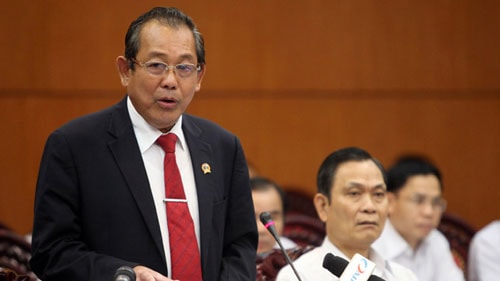The quality of questioning is increasingly improved.
The quality of questioning is increasingly improved, clearly demonstrating the supervisory responsibility of National Assembly deputies before voters nationwide.
The National Assembly has just finished its 4th working week with 2 main contents: final review of the Draft Amendment to the 1992 Constitution before pressing the button to pass and questioning members of the Government. It can be said that with a series of issues arising from real life, the questioning session has attracted special attention from voters nationwide with hot issues such as: hydroelectric dams releasing floodwaters, wrongful convictions and torture, 1% or 30% of civil servants working ineffectively, why the agricultural sector is facing difficulties...
After group discussions and plenary discussions in the hall, earlier this week, the Committee for Drafting Amendments to the 1992 Constitution presented to the National Assembly a 26-page explanation and acceptance, presenting in detail all the issues on which National Assembly delegates contributed their opinions.
 |
| Chief Justice of the Supreme People's Court Truong Hoa Binh speaks before the National Assembly |
National Assembly Chairman Nguyen Sinh Hung said: The Constitutional Amendment Drafting Committee has absorbed the maximum intellectual quintessence of the people. After this session, National Assembly deputies, with their sense of responsibility, will continue to contribute their opinions in writing with the aim of having the best draft before the National Assembly approves it on November 28.
During three days of questioning, the Prime Minister and four Ministers and heads of sectors directly answered a series of questions raised by National Assembly deputies.
First of all, regarding the issue of hydropower flood discharge, both the Prime Minister and the Minister of Agriculture and Rural Development acknowledged that, in addition to the positive aspects, there have been some shortcomings and weaknesses in both planning and project establishment, appraisal, approval and construction. These shortcomings and weaknesses have many causes, among which the subjective cause is the state management of the Government and local authorities. The Prime Minister also said that the designs of 205 hydropower projects under construction will be reviewed, and if they are found to be unsafe, they can be stopped immediately.
Along with the hydropower plant's flood discharge, the wrongful conviction of Mr. Nguyen Thanh Chan - a typical case that has caused people to lose confidence - was also raised by many delegates to the head of the Judiciary. The question is whether there was a wrongful conviction or not, whether there was torture or not, and what is the responsibility of the sectors? Chief Justice of the Supreme People's Court Truong Hoa Binh said that this responsibility belongs to both the Public Security and the Procuracy. The Judiciary alone has convened a meeting of the Council of Judges to review this verdict.
The Supreme People's Court's Judicial Council has accepted the appeal to overturn the verdict and reinvestigate. To conclude whether there is a miscarriage of justice or not, there must be objective and convincing evidence. Meanwhile, the head of the public security sector, Minister Tran Dai Quang, said that if forced confessions or torture are discovered, they will be dealt with firmly, including criminal prosecution.
Regarding the agricultural sector, although the issues raised are not new such as: how to restore the growth momentum of the agricultural sector, help farmers feel secure in production, not abandon their fields and grow rice with a profit of 30%... but Minister of Agriculture and Rural Development Cao Duc Phat has given thorough explanations, helping National Assembly delegates and millions of voters to see more clearly the current difficulties of the agricultural sector.
As for the Home Affairs sector, Minister Nguyen Thai Binh's statement that 30% of civil servants work ineffectively is just public opinion, has made many delegates and voters think that such an answer is unsatisfactory and impractical. Public opinion also hopes that the Home Affairs sector needs to clarify: 1% or 30% of civil servants work ineffectively by conducting a practical investigation to answer clearly to the people instead of such general and arbitrary answers.
Along with the Prime Minister and 4 Ministers and heads of sectors, 7 other Ministers also participated in explaining and clarifying many issues under their responsibility.
According to the assessment of National Assembly Chairman Nguyen Sinh Hung, this was a fruitful question and answer session, with a very frank, constructive and enthusiastic atmosphere, and at the same time in the spirit of solidarity and construction. The issues chosen by the National Assembly were consistent with the issues that need to be solved by real life as well as the people. According to the assessment of National Assembly deputies, the management style of National Assembly Chairman Nguyen Sinh Hung was both humorous and resolute, helping deputies practice their questioning skills, as well as the fluent answering skills of Ministers and leaders.
The lively and frank atmosphere in the National Assembly this week shows that the quality of questioning is increasingly improving, clearly demonstrating the supervisory responsibility of National Assembly deputies before voters nationwide.
Entering the final working week of the 6th session, the National Assembly will decide on many important issues of the country, including the Draft Amendments to the 1992 Constitution, the Draft Amendments to the Land Law and the Draft Law on Citizen Reception./.
According to VOV






